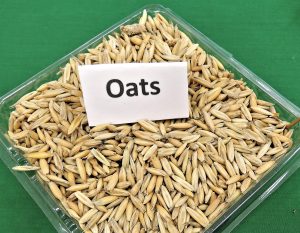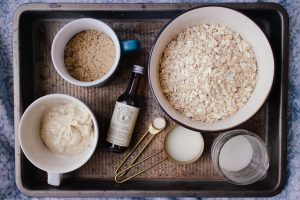
Oats are one of the most versatile, nutritious, and healthiest grains you can consume. They’re a popular choice for breakfast, snacks, and baking since they can be made into a hot cereal, granola, or oatmeal cookies. Aside from being delicious, oats are chock full of fiber, vitamins, minerals, and antioxidants that can help you stay healthy and energized throughout the day.
Benefits of Oats
Oats are a great source of fiber and protein. One cup of oats contains about 6 grams of fiber, along with 7 grams of protein. Fiber helps slow digestion and keep you feeling full for longer, while protein helps to build and maintain muscle tissue. Both fiber and protein are essential for a healthy diet, so oats are a great way to get an adequate amount of both.
Oats are also a great source of vitamins and minerals. They contain B vitamins, iron, calcium, magnesium, phosphorus, and potassium. These vitamins and minerals are important for a variety of bodily functions, including energy production, muscle and bone growth, and blood sugar regulation. Eating a diet rich in oats can help ensure you get the vitamins and minerals your body needs.
Oats are also a great food for controlling blood sugar levels. Oats contain a type of fiber called beta-glucan, which can help slow digestion and help regulate blood sugar levels. This can be especially beneficial for those with diabetes or pre-diabetes.
Perhaps the most well-known benefit of oats is their cholesterol-lowering qualities. Studies have shown that the beta-glucan in oats can help reduce LDL cholesterol, or “bad” cholesterol, levels. This can help lower your risk of heart disease and stroke.
Oats are incredibly versatile and can be used in a variety of recipes. Oats can be cooked into oatmeal, added to smoothies, baked into cookies and muffins, used in savory dishes, and more. This makes them a great addition to any diet, as you’ll never get bored of eating them.
As you can see, oats offer a number of health benefits that make them an excellent addition to any diet. They are a great source of fiber and protein, as well as vitamins and minerals, and they can help regulate blood sugar levels and lower cholesterol. Plus, they are incredibly versatile, making them a great choice for any meal or snack. So next time you’re grocery shopping, be sure to pick up a box of oats to add to your diet. You won’t regret it!
History of Oats
Oats are considered a superfood today and are part of many diets around the world, but where did oats come from? While oats may have been around for a long time, it took centuries for oats to become the beloved grain it is today.
Oats have been around for thousands of years, but their exact origin is not known. Evidence suggests that oats originated in Central and Western Asia and were then spread to Europe by nomadic tribes. Oats were first cultivated in Europe in the early Bronze Age, around 3000 BC. By 500 BC, oats were an important crop grown in Scotland and other parts of the British Isles.
In the Middle Ages, oats were an important food source for the poor in Europe. Oats were used in gruel and porridge, and were often mixed with other grains such as barley and rye. Oats were also used as animal feed, which helped to sustain the agricultural economy.
In the 16th century, oats began to be cultivated in the Americas. They were introduced to North America by the Europeans and were cultivated primarily for animal feed. Oats were also grown in South America, but it wasn’t until the 19th century that oats began to be grown commercially.
In the 19th century, oats were grown for both human and animal consumption. Oats were used in porridge, muesli, and oatcakes, and were also used in topical treatments for skin conditions such as eczema and psoriasis. By the late 19th century, oats had become a popular breakfast cereal and were becoming increasingly available in pre-packaged varieties.
In the 20th century, oats were further developed as a food source and their popularity continued to grow. Oats were used in breakfast cereals, oatmeal, granola bars, and cookies. They were also used in the production of beer, bread, and other baked goods.
The 21st century has seen further innovation with oats, such as adding them to protein shakes and energy bars. Oats are now grown commercially in many parts of the world, and are widely available in grocery stores. They are also used in a variety of dishes, from savory to sweet.
Today, oats are part of many diets around the world. They are a good source of energy and are rich in fiber, vitamins, and minerals. Oats are also gluten-free, making them a great option for those with gluten allergies or sensitivities.
Oats have come a long way since their humble beginnings in Central and Western Asia. They have evolved into a beloved food source that is loved by people around the world. With their many health benefits, oats are sure to remain a staple in diets for generations to come.
Cooking Oats
When it comes to cooking with oats, there are a few tips and tricks that can help you get the most out of your grains. First and foremost, make sure you’re using the right type of oats. Steel-cut oats will take the longest to prepare, while rolled oats, quick oats, and instant oats are all more convenient options. Whichever type of oats you choose, be sure to check the cooking instructions on the package and adjust based on your preferences.
Before you start cooking, you’ll want to make sure your oats are ready to go. This means rinsing them in cold water and draining any excess liquid. To give your oats an extra boost of flavor, you can also soak them overnight or add other ingredients like spices, dried fruit, nuts, or seeds. This is a great way to add additional fiber, protein, and vitamins and minerals to your recipes.
When it comes to cooking oats, there are a variety of methods you can use. For a traditional oatmeal, you can simply cook the oats in a pot on the stove with water or milk. If you’re feeling adventurous, you can try baking oatmeal or turning your oats into oat flour. If you’re looking for something quick and easy, you can also make overnight oats in a jar or a batch of no-bake oatmeal bars.
No matter how you choose to cook your oats, you can rest assured knowing that you’re getting a healthy and nutritious meal or snack. Oats are a great way to start your day or fuel your afternoon, and with so many delicious recipes to choose from, you’ll never get bored. So get creative in the kitchen and start cooking with oats today!

Clinical Trials on Oats
Oats have been extensively studied in clinical trials, with many of the trials focusing on its potential to reduce the risk of cardiovascular disease. In one study, a group of participants with elevated cholesterol levels consumed a daily dose of oat bran for six weeks. The results of the study showed that the daily consumption of oat bran significantly lowered total cholesterol levels, low-density lipoprotein (LDL) cholesterol levels, and triglycerides levels.
In another study, postmenopausal women who consumed at least three servings of oats per week had a significantly lower risk of cardiovascular disease than those who did not consume oats.
In addition to cardiovascular health, oats may also have the potential to reduce the risk of type 2 diabetes. A meta-analysis of 11 clinical trials found that consuming oats was associated with a lower risk of type 2 diabetes. Furthermore, the analysis found that consuming oats for at least three months was associated with a greater reduction in the risk of type 2 diabetes.
Oats may also have benefits for weight management. In a clinical trial, obese adults consumed a daily dose of oat bran for eight weeks, and the results showed that the daily consumption of oat bran was associated with significant weight loss. In another clinical trial, participants consumed a daily dose of oat cereal for six months, and the results showed that the daily consumption of oat cereal was associated with significant decreases in body mass index (BMI) and waist circumference.
Oats’ potential health benefits are not limited to the fields of cardiovascular health, type 2 diabetes, and weight management, as recent clinical trials have also looked into the potential benefits of oats for digestive health. In a clinical trial, a group of participants who consumed a daily dose of oat bran for four weeks had significantly reduced symptoms of irritable bowel syndrome (IBS).
Below is a video on an easy oats recipe.